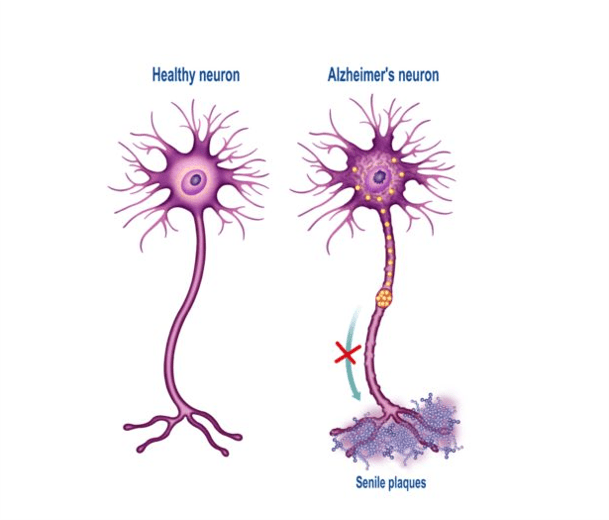Evidence suggests cannabis may help improve the lives of Alzheimer’s patients and caregivers while potentially slowing disease progression. Historical records date its use back to 1890, with generally positive results. Interestingly, some Alzheimer’s drugs work similarly to how cannabis interacts with the brain, raising the question—can weed be a viable treatment?
According to the Mayo Clinic, Alzheimer’s disease is a progressive brain disorder that causes brain cells to waste away and die. It’s different than dementia; rather, it is the most common cause of dementia.
Dementia is a term for a particular group of symptoms that lead to a continuous decline in behavioral and social skills, disrupting a person’s ability to function independently. Alzheimer’s disease can cause dementia because of the changes it causes to the brain.
These changes include:
Over time, those neurofibrillary tangles form dense, misfolded webs that prevent communication between nerves. This blockage reduces the levels of a neurotransmitter called acetylcholine, and it’s this deficiency that drives many of the clinically observable manifestations seen in Alzheimer’s patients, like:

I took this image from the original cannabis + Alzheimer’s article
Image caption: Alzheimer’s disease blocks communication between nerves, causing many of the issues associated with Alzheimer’s.
Image alt text: Treating Alzheimer’s can be difficult because of nerve communication blocked by neurofibrillary tangles.
Consuming weed has been shown to help relieve many of these symptoms.
Weed and Alzheimer’s have an interesting relationship because the mechanism needed to address the issues in the brain that Alzheimer’s causes is naturally found in the cannabis plant.
It all starts with the body’s Endocannabinoid System (ECS).
The ECS maintains balance in the body. Alzheimer’s disease causes nerve tangles and inflammation which the ECS reads as an imbalance. This triggers the ECS to release endocannabinoids, helping to improve neuroinflammation, oxidative stress, neurogenesis, and cerebral blood flow.
The ECS has two main receptors: CB1 and CB2. The phytocannabinoids found in the cannabis plant stimulate these receptors in the same way the body’s endocannabinoids do.
THC, in particular, loves to stimulate CB1, which is perfect for treating Alzheimer’s because activating the CB1 receptors on the surface of microglial cells (the brain’s support cells) decreases the glutamate release from nerve cells that can cause harmful inflammation.
CB1 receptor activation also inhibits acetylcholinesterase, an enzyme responsible for the breakdown of acetylcholine—that neurotransmitter that drives the manifestations of Alzheimer’s. This block increases acetylcholine at nerve endings, helping to reduce those manifestations. Pharmaceutical drugs use this exact mechanism to increase acetylcholine concentration in the nerve terminals of Alzheimer’s patients.
CB2 also plays an important role here. You can find these receptors on the surface of microglial cells as well, and their activation initiates a cascade of events that potentiates beta-amyloid plaque removal and reduces nerve inflammation. Cannabis phytocannabinoids, including THC, naturally act on the CB2 receptor.
Sir John Russell Reynolds, MD, physician to Queen Victoria, published his findings on cannabinoid treatment in dementia patients back in 1890. He described patients wandering and fidgeting at night, a behavior he dubbed “sundowning.” He dosed them with an Indica at bedtime and noted, “It has been effective for months and years, without any increase in the dose.”
Fast-forwarding to modern times, recent studies of nursing home patients with Alzheimer’s dementia have reported improvements in sleep, agitation, irritability, and caregiver distress after having THC oil added to their meds. Preliminary rodent studies are demonstrating that a one-to-one (1:1) THC-to-CBD ratio can reduce harmful amyloid plaque.
Additionally, according to two rodent studies completed in 2011, CBD has been shown to reduce inflammation around the brain and its nerve pathways and potentially restore damaged neurons, as well as reduce the cognitive deficits associated with the buildup of amyloid-ß (Aß) plaques.
These results are among dozens of other studies exploring the relationship between weed and Alzheimer’s, nearly all of which have yielded positive results.
Look for weed strains high in the terpenes myrcene and linalool, as well as those high in THC content. Myrcene enables cannabinoids to transfer from the blood to the brain more quickly, linalool promotes relaxation, and THC can help slow the disease’s progression by activating the ECS.
Check out these strains if you’re considering experimenting with weed and Alzheimer’s:
The key here is to keep things balanced and intentional. Start with a low dosage—around 2.5mg of THC—give it time, and only increase as necessary, doing so slowly. Specific dosing suggestions are difficult to provide as the effects will vary based on the strain and the patient’s metabolism and experience with weed.
Consider using a balloon vaporizer as the delivery system in order to avoid fire hazards and lung damage. Patients should take a 1-2 second inhalation and wait 10 minutes to evaluate the results before deciding to repeat the process to reach the desired effect.
Even if you live in a state with legal adult-use cannabis, you’re going to want to get a medical card to avoid paying high taxes. If you’re in Arkansas, Oklahoma, or Missouri, Ozark MMJ Cards can help.
Start your MMJ card registration or renewal process with us now. We have same-day appointments available so you can experience relief as soon as possible.
And if you’re a caretaker in need of some peace, we can help with that too! Get in touch with us today.
SOURCES: